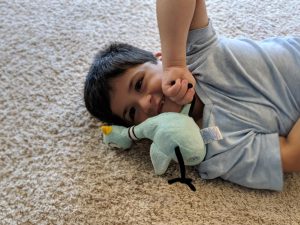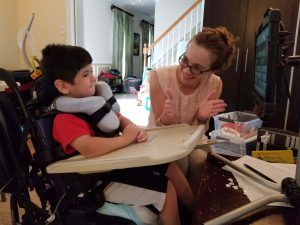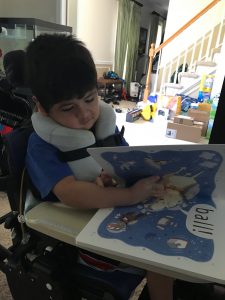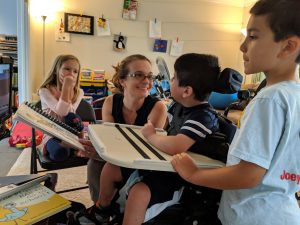 There are times when presuming competence is easy. Joey has a light in his eyes, and he’s clearly trying to tell me something. He giggles and laughs, and persists in finding the right answer. We’re connected, and I know he’s trying to find the right word.
There are times when presuming competence is easy. Joey has a light in his eyes, and he’s clearly trying to tell me something. He giggles and laughs, and persists in finding the right answer. We’re connected, and I know he’s trying to find the right word.
Other times, it’s not that easy. He knows his numbers and letters. I know he knows them. I have data that reflects this. So what’s up today – why is he selecting every number but the one I’m asking him?
Has he regressed? Is he having trouble lining up his eyes with his device? Is he bored? Is he rebelling? Did he hear my question? Did I just imagine that he knew his numbers and letters last spring? There are times it is easy for that last question to slip into our thoughts when we are working with students like Joey. For some reason, the worst thing that we can imagine as special education teachers is that we give a student credit for doing something they cannot do. And so, in the world of self-protection to our own egos, we are more likely to assume a student can’t do something than can do something. [Read more…]

 When we talk about reciprocal communication, we think about having a conversation when one person speaks, someone replies, then the initial speaker follows up.
When we talk about reciprocal communication, we think about having a conversation when one person speaks, someone replies, then the initial speaker follows up.  I plopped down beside Joey one afternoon, and asked him how his day had been. He quickly began chatting away,
I plopped down beside Joey one afternoon, and asked him how his day had been. He quickly began chatting away,  I was gathering my things to leave Joey’s house, when I heard Joey say
I was gathering my things to leave Joey’s house, when I heard Joey say  As we prepared Joey for school, I noticed a dip in his AAC output data. There were many reasons for this, and a main one was that Joey is becoming stronger at navigating his device. Although he still may select the wrong icon, he is able to navigate himself back to the right page faster. He selects fewer wrong pictures, which leads to a decrease in total output, but an increase in meaningful output.
As we prepared Joey for school, I noticed a dip in his AAC output data. There were many reasons for this, and a main one was that Joey is becoming stronger at navigating his device. Although he still may select the wrong icon, he is able to navigate himself back to the right page faster. He selects fewer wrong pictures, which leads to a decrease in total output, but an increase in meaningful output.
